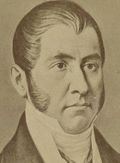 |
José Pedro Antonio Vélez y (de) Zúñiga
b. 1787, Villagutiérrez del Águila (now Villanueva), Zacatecas
d. 5 Aug 1848, Mexico City |
| Title: |
Miembro del Supremo Poder Ejecutivo Provisional (Member of the Provisional Supreme Executive Authority) |
| Term: |
23 Dec 1829 - 1 Jan 1830 |
| Chronology: |
23 Dec 1829, executive power is transferred to the Provisional Supreme Executive Authority in accordance with Art. 97 of the Constitution of 1824, resolution of the Consejo de Gobierno (Council of Government), session of the Council of Government [1][2] |
| |
23 Dec 1829, took an oath of office, session of the Council of Government [1] |
| |
1 Jan 1830, Provisional Supreme Executive Authority ceased to function upon the installation of a successor [3] |
| Biography: |
| Attended the Colegio de San Luís Gonzaga of Zacatecas, seminary and the University of Guadalajara; earned licentiate (1803) and doctorate (1804); later also received licentiate and doctorate in canons (1810), licentiate and doctorate in civil law (1818); taught at the University of Guadalajara; was elected a member of the municipal council of Guadalajara (1821); elected a member of the Provincial Deputation of the Province of Nueva Galicia (1822?-1823) and served as its secretary; elected a member of the Congreso Constituyente of the State of Jalisco (1823-1825) and served as its president (14 Sep 1823 - 16 Oct 1823, 14 Nov 1824 - 14 Dec 1824); was one of the first judges appointed to sit in the federal Supreme Court of Justice (1824-1848); served as president of the Supreme Court of Justice (1828-1830, 1844, 1846); following the coup d'état of 23 Dec 1823, he became a member of the Supremo Poder Ejecutivo Provisional (23 Dec 1829 - 1 Jan 1830) set up by the Council of Government, pending the arrival of Vice President of the Mexican United States Anastasio Bustamante to the capital; senator from Zacatecas; served as minister of justice and public instruction (1842-1843); serving as president of the Supreme Court of Justice, he refused to take oath of allegiance (3 Dec 1844) to the government of Valentín Canalizo and supported the 'three-hour revolution' of 6 Dec 1844. |
| Biographical sources: Diccionario Porrúa de historia, biografía y geografía de México. 5th ed. rev. (Mexico City: Editorial Porrúa, 1986); death and burial record in Distrito Federal, Asunción Sagrario Metropolitano (Centro), Defunciones 1843-1849, fol. 104. |
| |
| [1] |
Colección de las leyes 1829-1830, p. 85. |
| [2] |
Serving as President of the Supreme Court of Justice, Vélez was made a member of the Provisional Supreme Executive Authority ex officio when the Council of Government passed a resolution appointing the executive in accordance with Art. 97 of the Constitution of 1824. |
| [3] |
The term of the Provisional Supreme Executive Authority is deemed to have expired on the day when Vice President of the Mexican United States Anastasio Bustamante issued a manifesto (dated 1 Jan 1830, Mexico City), proclaiming the assumption of executive authority (El Sol, No. 186, 2 Jan 1830, p. 741). |
| |
Image: Cruces y Campa Collection, Latin American Library, Tulane University. |

